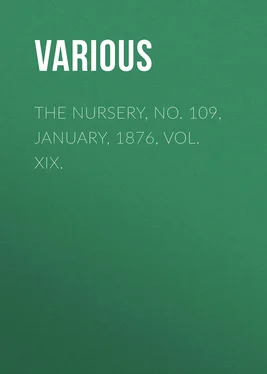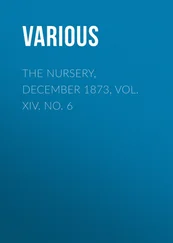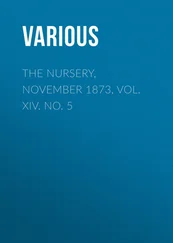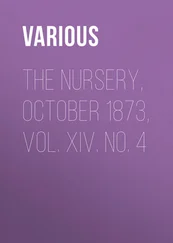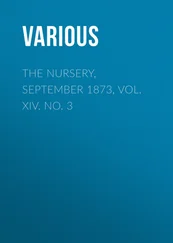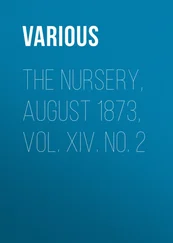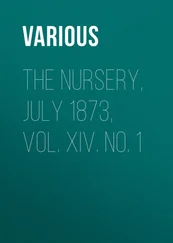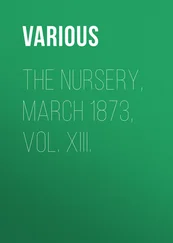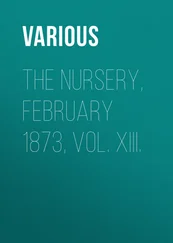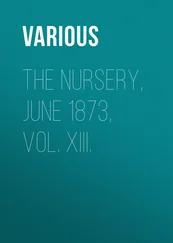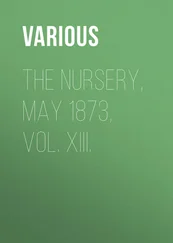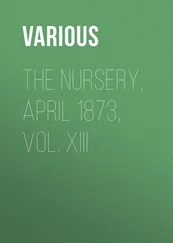Various - The Nursery, No. 109, January, 1876, Vol. XIX.
Здесь есть возможность читать онлайн «Various - The Nursery, No. 109, January, 1876, Vol. XIX.» — ознакомительный отрывок электронной книги совершенно бесплатно, а после прочтения отрывка купить полную версию. В некоторых случаях можно слушать аудио, скачать через торрент в формате fb2 и присутствует краткое содержание. Жанр: foreign_children, periodic, foreign_antique, foreign_prose, на английском языке. Описание произведения, (предисловие) а так же отзывы посетителей доступны на портале библиотеки ЛибКат.
- Название:The Nursery, No. 109, January, 1876, Vol. XIX.
- Автор:
- Жанр:
- Год:неизвестен
- ISBN:нет данных
- Рейтинг книги:3 / 5. Голосов: 1
-
Избранное:Добавить в избранное
- Отзывы:
-
Ваша оценка:
- 60
- 1
- 2
- 3
- 4
- 5
The Nursery, No. 109, January, 1876, Vol. XIX.: краткое содержание, описание и аннотация
Предлагаем к чтению аннотацию, описание, краткое содержание или предисловие (зависит от того, что написал сам автор книги «The Nursery, No. 109, January, 1876, Vol. XIX.»). Если вы не нашли необходимую информацию о книге — напишите в комментариях, мы постараемся отыскать её.
The Nursery, No. 109, January, 1876, Vol. XIX. — читать онлайн ознакомительный отрывок
Ниже представлен текст книги, разбитый по страницам. Система сохранения места последней прочитанной страницы, позволяет с удобством читать онлайн бесплатно книгу «The Nursery, No. 109, January, 1876, Vol. XIX.», без необходимости каждый раз заново искать на чём Вы остановились. Поставьте закладку, и сможете в любой момент перейти на страницу, на которой закончили чтение.
Интервал:
Закладка:
Various
The Nursery, No. 109, January, 1876, Vol. XIX. / A Monthly Magazine for Youngest Readers
CHRISTMAS AT THE NORTH
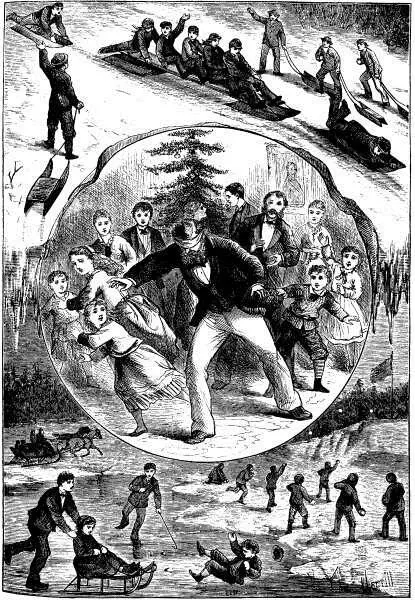
CHRISTMAS AT THE NORTH.
Hark! the bells are sounding;
Christmas draweth nigh;
Now let joy abounding
Bid all trouble fly.
Ye who pine in sorrow,
Come, be cheered to-day;
Of our gladness borrow,
As you freely may.
First give your attention
To our Christmas-tree;
But pray do not mention
All the things you see:
These are for surprises
To the children dear,—
To the Anns, Elizas,
Johnnys, Charleys here.
Are you hale and hearty,
And still young enough?
Come, then, join our party,
And play blind man's buff.
But if with the coasters
You would rather be,
See them there, the boasters!
Join them: you are free.
Hark! the sleigh-bells tinkle:
Do you wish a ride?
Will it smooth a wrinkle
Just to have a slide?
See, the road invites you;
See, the ponds entice:
Take, then, what delights you:
Whether snow or ice.
If the path to glory
Best your mood befits,
If you'd live in story,
And can brave hard hits,
See, where heroes yonder
Storm the fort with balls;
Do not stop to ponder:
Go where glory calls!
Or, perhaps, the skaters
Now attract you most:
We are patient waiters—
Will you skate, or coast?
Do not fear a tumble;
See poor Tommy there!
Up, without a grumble,
He will never care.
Welcome to our pleasures
And our Christmas cheer!
We'll not stint the measures:
Would you all were here!
Boys and girls together,—
From all parts and climes,
To enjoy this weather,
And these Christmas times!
POMPEY GUARDING BABY
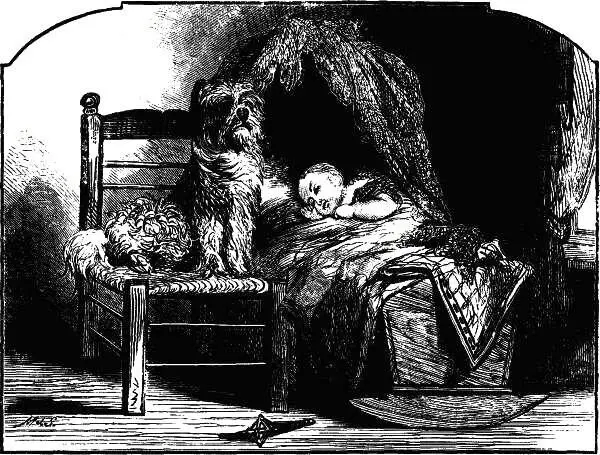
My real name is Pompey; but Mr. John sometimes calls me Pompous. What he means by that I do not know. Perhaps it is a joke. Mr. John is the eldest brother of Dot, the baby.
I am put here to keep watch over Dot. That is a picture of me as I appear seated on a chair by the side of the cradle where Dot is sleeping.
I am very fond of babies. One reason of it, I think, is, that they cannot hurt me with their little hands. They pull my ears, but not so hard as to give me pain.
Once, on a hot day, when my mouth was open, and my tongue was out, Dot took hold of my tongue, and pulled it as hard as he could. I did not even say Bow-wow . I let him pull away.
I would have all people know that this baby is not to be touched while I am here. If you come near to disturb baby, I shall bark; but, if you try to touch him, I shall bite. So be careful. You must not even touch baby's rattle that lies on the floor.
I hear my mistress tell people what a good dog I am, and how she can trust me to take care of baby. Yes, I am proud to say I do my duty. I hold my head up, and keep my eyes wide open. That drawing of me is from a photograph, and is a very good likeness. As I can't write, I have got Master John to write this down for me.
Master John.THE PARROT FEEDING ITS YOUNG
The parrot is a curious bird. Here is a picture of one feeding its young. It has a large hooked beak, and climbs trees by the aid of its beak and feet.
The plumage of parrots varies in color. I have seen it of a bright green, also, red and gray. These birds were well known to the ancient Greeks and Romans, who got them mostly from India and Africa.
The parrot, as every child knows, can be taught to talk. This power it shares with some other birds whose tongues are thick, round, and almost the same in form as that of the parrot. Starlings, blackbirds, jays, jackdaws, and ravens can imitate the human voice.
The parrot imitates all the noises it hears—the mewing of cats, the barking of dogs, and the cries of birds—as easily as it imitates speech. The parrots brought from Africa seem to prefer imitating the voices of children, and, on that account, more easily receive their education from them.
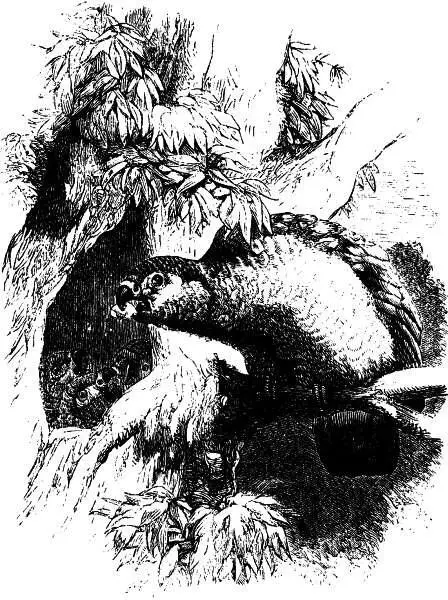
But the gray parrot imitates the grave tones of older persons. A parrot from Guinea, taught on the voyage by an old sailor, had caught up his hoarse voice and cough perfectly. Afterwards, owned and taught by a young girl, it did not forget the lessons of its first master. It was amusing to hear this bird pass from a soft, girlish voice to his hoarse and sailor-like tone.
Not only has the parrot the power of imitating the human voice, but it seems to wish to do so. This is shown by its attention in listening, and by the efforts it makes to repeat every word. It will often repeat words or sounds that no one has taken the trouble to teach it.
A parrot which had grown old with its master, and shared with him the pains of old age, being used to hear but little more than the words, "I am very ill," when asked, "What is the matter, Polly?" answered in a dismal tone, and stretching itself, "I am very ill."
The language of the parrot is not wanting in ideas. When you ask one if it has breakfasted, it knows well how to answer you, if it has satisfied its hunger. It will not tell you that it has breakfasted when this is not the case: at least, you cannot force it to say "No" when it ought to say "Yes."
I have heard of a parrot, which, when pleased, would laugh most heartily, and then cry out, "Don't make me laugh so! I shall die, I shall die." The bird would also mimic sobbing, and exclaim, "So bad, so bad! got such a cold!" If any one happened to cough, the parrot would remark, "What a bad cold!"
Uncle Charles.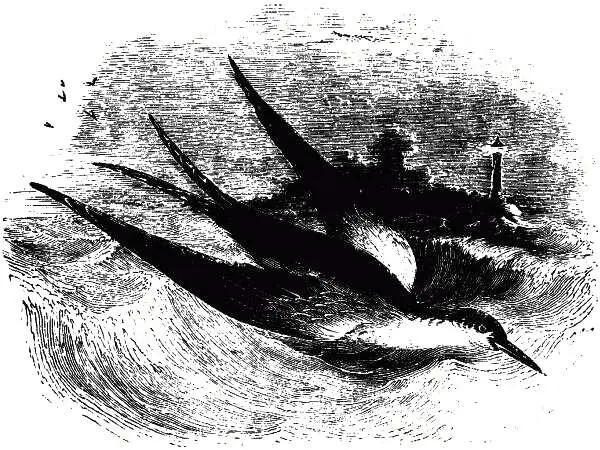
The Sea-Swallow.
LITTLE RUTH'S PRAYER
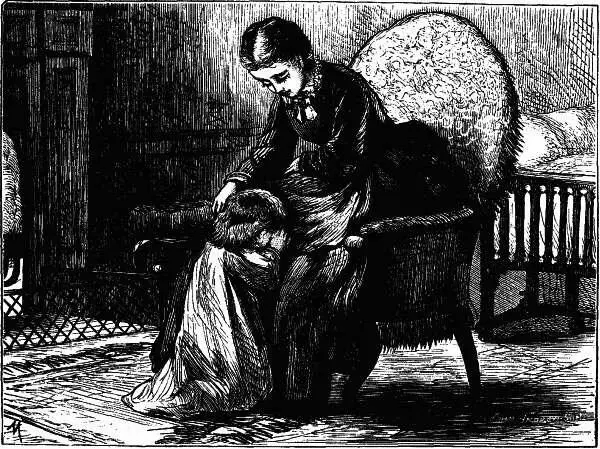
Stormy and chilly had been the day;
Drifts of snow on the sidewalk lay:
All who were out in the wintry street
Went shivering on with rapid feet;
And some were poor, and thinly clad,
And wished that a good warm home they had.
But, gloomy without, it was bright within,
In the house where our little Ruth had been:
By the nursery fireside's cheerful blaze
Merry had been her thoughts and plays;
She had dressed her dolls for a fancy ball,
And read her story-books one and all.
But when, at the close of the happy day,
She knelt, her one little prayer to say,
She thought of the hungry, perishing poor,
Of the children who cold and sorrow endure,
And, laying her head on her mother's knee,
Said, "Give them, O Father, all you give me !"
ARTHUR'S MISHAP
I am a little boy, three years old, named Arthur; and I want to tell you what happened to me last summer.
I went down to the seashore to visit my grandmamma, alone, without mamma, or Mary, my nurse. Grandpapa took me in the cars, and I staid almost a week. I had a good time; for they have horses and cows and pigs and chickens, and a swing.
Читать дальшеИнтервал:
Закладка:
Похожие книги на «The Nursery, No. 109, January, 1876, Vol. XIX.»
Представляем Вашему вниманию похожие книги на «The Nursery, No. 109, January, 1876, Vol. XIX.» списком для выбора. Мы отобрали схожую по названию и смыслу литературу в надежде предоставить читателям больше вариантов отыскать новые, интересные, ещё непрочитанные произведения.
Обсуждение, отзывы о книге «The Nursery, No. 109, January, 1876, Vol. XIX.» и просто собственные мнения читателей. Оставьте ваши комментарии, напишите, что Вы думаете о произведении, его смысле или главных героях. Укажите что конкретно понравилось, а что нет, и почему Вы так считаете.
